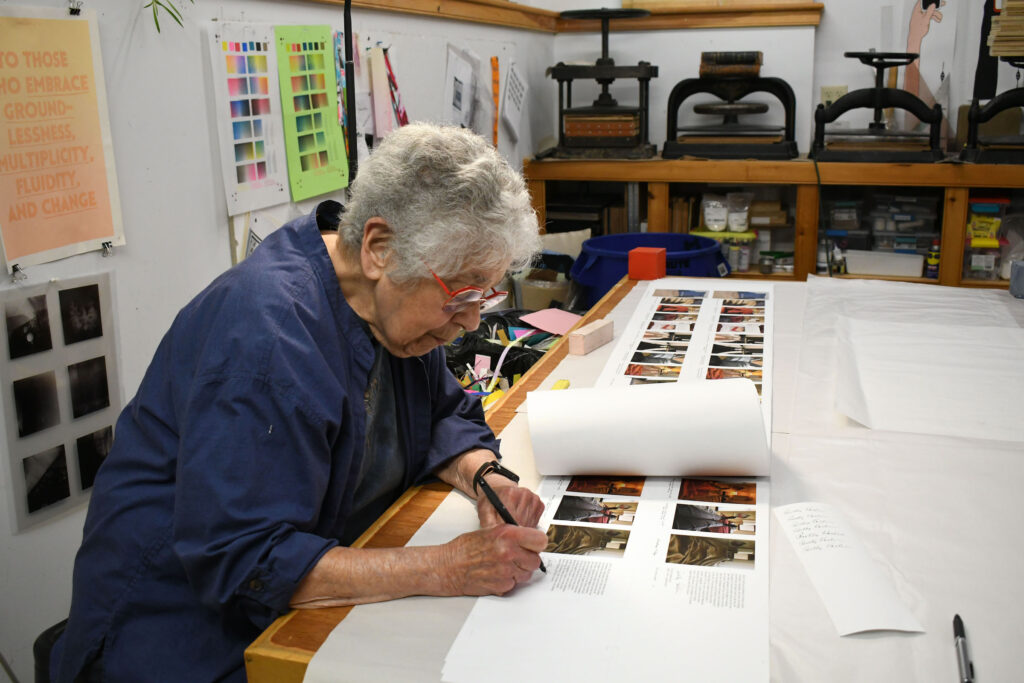[ad_1]
ROSENDALE, New York — It was the summer of 1974 when college friends Ann Kalmbach, Tatana “Tana” Kellner, Anita Wetzel, and Barbara “Babs” Leoff Burge rented out a two-story single-family house in the working-class town of Rosendale, about two hours north of New York City. It was a time of social reckoning in the United States, the peak of the second-wave feminist movement that saw the passage of Roe v. Wade and the emergence of women-led arts spaces and communities like AIR Gallery, the “Where We At” Black Women Artists, Inc., and the Heresies Collective. And like these groups, the quartet of artists in Rosendale were frustrated with the absence of opportunities for women artists. They had part-time jobs (but still couldn’t independently take out a credit loan) when they forged the Women’s Studio Workshop (WSW) — a new feminist teaching arts collective that aimed to create accessible pathways for themselves and their peers, beyond the preexisting institutions that had historically excluded them from collections, exhibitions, and grants.


Five decades years later, WSW has expanded from a grassroots organization in a framehouse to a 501(c)(3) nonprofit that has hosted more than 1,000 residents and studio interns over the course of its history. In 1980, the workshop relocated its facilities to its current Binnewater Lane address, where studios for papermaking, darkroom photography, ceramic arts, bookbinding, and various printing practices are housed in a repurposed 19th-century cement company mining store. And the organization is still growing, currently constructing a new space on the property to house more studios and artist residences.


But throughout this extensive transformation, WSW has always remained steadfast in its original mission of inclusivity and accessibility, rooted in arts education programs and residencies that support artists historically “underserved based on their gender identity,” Natalie Renganeschi, WSW’s deputy director, told Hyperallergic during a visit to the workshop this week.
“We used to say woman-identifying artists, but it’s expanded,” Kalmbach said. “We felt that, with expanded societal understandings of what gender is, viewing it as a binary was sort of accepting a very patriarchal definition, which was the system we were fighting against,” Renganeschi continued. WSW’s mission statement now includes trans, intersex, nonbinary, and gender-fluid identities.

Community-building has always been a fundamental part of WSW’s work. Its long-standing Artists’ Book imprint has published over 230 hand-printed, limited-edition artists’ books since 1979, and the Art-In-Education program connects its resident artists with students from fourth grade through high school in the Kingston City School District. There’s also its 50-year daily lunch tradition, which gathers every staff member, intern, and resident artist for a potluck meal.
“It’s a moment when we erase the hierarchy and everyone contributes a little so that we all can have a lot,” Renganeschi explained.
Its staff includes both newcomers, such as its Executive Director Sharon Louden, who took over the role in September, and loyalists like Studio Manager Chris Petrone, who began working at WSW 20 years ago as an intern. Its founding spirit also maintains an active presence, with Kalmbach and Kellner, who are also partners, living across the street as “neighbors, schemers, and trusted advisors,” in Renganeschi’s words. Burge, now 91 years old, also lives nearby in New Paltz. Wetzel died in Rosendale in 2021.
WSW has sustained itself through a combination of private, state, and federal funding; two annual fundraising events (a gala and a nearly 30-year-old Chili Bowl Festival); and its celebrated Artists’ Book imprint, which has perennial ties with institutional collections including the Library of Congress, Vassar College, and the Bainbridge Island Museum of Art.


The traveling exhibition A Radical Alteration: Women’s Studio Workshop as a Sustainable Model for Art Making, on view at WSW through January 2025, traces the organization’s long history of bookmaking, exploring the medium not just as a crucial means of production but also as an extension of radical art. The show includes works like Kellner’s self-published accordion book “Suspender Saga” (1979), which features humorous silkscreen-printed photos of Kalmbach wearing suspenders in various styles, and IBe’ Bulinda Crawley’s sculptural pamphlet “11033” (2022), which is a meditation on Black motherhood and incarceration. Another highlight is “Going to camp: a meditation about AIDS, quarantine, exile and personal loss” (1987) by the late diarist and artist Lyman Piersma, one of the few cis men to publish work through WSW.
“It was before ACT UP, before any legislation had been created, and the founders invited an HIV-positive artist to come and live with them, work in the studios, and create this edition of an artist book that tells the stories of all of those who were dying of AIDS,” said Renganeschi. The work, she emphasized, exemplifies the “consistency of WSW’s publishing voices that need to be urgently heard.”
This Saturday, November 16, WSW will commemorate its 50th anniversary with an afternoon-long birthday bash on its campus. The celebration is both a toast to its legacy and founders, as well as a fundraiser to support its work over the next 50 years and beyond.





[ad_2]
Source link

